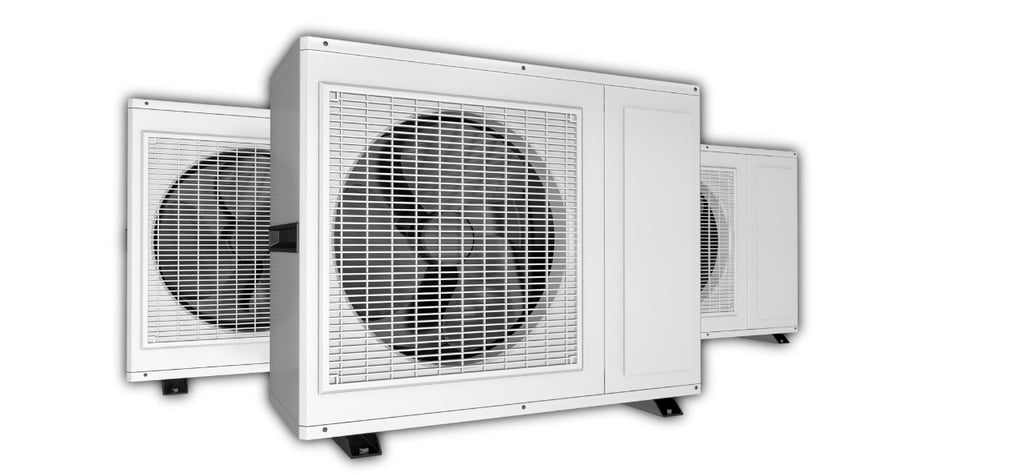Air Source Heat Pump Grant London
"Discover how to reduce energy bills and lower your carbon footprint with the Air Source Heat Pump Grant London. Learn about eligibility, benefits, and how to apply."
David Stevens
8/23/20247 min read


As the world shifts towards sustainable energy solutions, the need to adopt eco-friendly practices has never been more urgent. One of the most effective ways to reduce your carbon footprint and save on energy bills is by installing an air source heat pump (ASHP). For homeowners in London, the good news is that several grants are available to help offset the cost of this investment.
In this blog, we'll explore everything you need to know about air source heat pumps, the grants available in London, how to apply, and the benefits of making this eco-friendly upgrade.
What Is An Air Source Heat Pump?
Before diving into the grants, it's essential to understand what an air source heat pump is and how it works. An ASHP is a renewable energy system that extracts heat from the outside air and transfers it indoors to heat your home and provide hot water. Unlike traditional heating systems that rely on fossil fuels, ASHPs use electricity to move heat, making them highly energy-efficient.
How Does It Work?
An ASHP works similarly to a refrigerator but in reverse. Here's a simplified breakdown:
Absorption: The pump absorbs heat from the outside air, even in cold weather.
Compression: The absorbed heat is then compressed to increase its temperature.
Heat Exchange: The heated air is transferred to your home’s heating system, either through radiators, underfloor heating, or warm air convectors.
Circulation: The process repeats, continuously providing warmth and hot water.
Types Of Air Source Heat Pumps
There Are Two Main Types Of Ashps:
Air-to-Air Heat Pumps: These pumps transfer heat to your home’s air, making them ideal for properties with good insulation. However, they don't provide hot water.
Air-to-Water Heat Pumps: These are more common in the UK and are suitable for both heating and hot water. They are compatible with underfloor heating systems and traditional radiators.
Why Choose An Air Source Heat Pump?
There are several reasons why homeowners in London are opting for air source heat pumps:
Energy Efficiency: ASHPs can achieve efficiencies of over 300%, meaning they produce three times more energy than they consume.
Lower Carbon Footprint: By using renewable energy, ASHPs significantly reduce greenhouse gas emissions.
Cost Savings: Although the initial installation cost can be high, the long-term savings on energy bills make it a worthwhile investment.
Eligibility for Grants: Various government grants are available to help reduce the upfront cost of installation.
Available Grants For Air Source Heat Pumps In London
Now that you understand the benefits of ASHPs, let's delve into the various grants available to London homeowners.
1. The Boiler Upgrade Scheme (BUS)
The Boiler Upgrade Scheme (BUS) is a UK government initiative aimed at encouraging homeowners to replace their old, inefficient boilers with renewable heating systems like ASHPs. Under this scheme, homeowners in London can receive a grant of up to £5,000 towards the cost of installing an air source heat pump.
Eligibility Criteria:
Your property must be in England or Wales.
The existing heating system should be a gas, oil, or electric boiler.
The property must meet certain insulation requirements.
New build properties are generally not eligible, except if you’re building your own home.
How To Apply:
Contact a certified installer to assess your property and provide a quote.
The installer will apply for the grant on your behalf.
Once approved, the grant will be deducted from your installation cost.
2. The Renewable Heat Incentive (RHI)
The Renewable Heat Incentive (RHI) is another government scheme that offers financial support to homeowners who install renewable heating systems, including ASHPs. Unlike the BUS, which offers a one-time grant, the RHI provides ongoing payments over seven years based on the amount of renewable heat your system produces.
Eligibility Criteria
The system must be installed by a certified Microgeneration Certification Scheme (MCS) installer.
The property must have a valid Energy Performance Certificate (EPC).
You must be a homeowner or private landlord.
How to Apply:
Ensure your property meets the eligibility requirements.
Apply through the Ofgem website.
Submit the necessary documentation, including your EPC and MCS certificate.
Payment Structure:
Payments are made quarterly over seven years.
The amount you receive is based on the estimated heat demand of your property, as stated on your EPC.
3. The ECO4 Scheme
The Energy Company Obligation (ECO4) scheme is designed to help low-income households reduce their energy bills by improving energy efficiency. This scheme is funded by energy suppliers and offers grants to cover the full cost of installing an ASHP.
Eligibility Criteria:
You must be receiving certain government benefits or have a low income.
The property must be privately owned or rented.
The existing heating system must be inefficient.
How to Apply:
Contact your energy supplier to check eligibility.
If eligible, an approved contractor will carry out the installation.
The grant will cover the full cost, so there’s no need to worry about upfront expenses.
How To Choose The Right Air Source Heat Pump For Your Home
Choosing the right ASHP for your home is crucial for maximizing efficiency and comfort. Here are some factors to consider:
1. Property Size and Layout
The size and layout of your property will determine the type and size of the ASHP you need. Larger homes with more rooms may require a more powerful system or multiple units.
2. Insulation Levels
Proper insulation is essential for ASHPs to work efficiently. If your home has poor insulation, you may need to improve it before installing a heat pump.
3. Existing Heating System
Consider whether your existing heating system is compatible with an ASHP. While air-to-water systems work well with underfloor heating, air-to-air systems may not be suitable if you rely on traditional radiators.
4. Noise Levels
Some ASHPs can be noisy, especially during the compression stage. If noise is a concern, look for models with a lower decibel rating.
5. Budget
While the grants can significantly reduce the cost, it’s essential to consider your budget. Get quotes from multiple installers and factor in the long-term savings on energy bills.
The Installation Process
Once you've chosen the right ASHP and secured a grant, the next step is installation. Here's what to expect:
1. Site Survey
A certified installer will visit your property to assess its suitability for an ASHP. They'll check insulation levels, the existing heating system, and the outdoor space where the unit will be installed.
2. Quotation And Grant Application
Based on the site survey, the installer will provide a detailed quote. If you’re applying for the Boiler Upgrade Scheme, the installer will handle the grant application on your behalf.
3. Installation Day
On the installation day, the process typically involves:
Outdoor Unit Installation: The main unit is installed outside your home, usually on a wall or the ground.
Indoor Unit Installation: If you're installing an air-to-water system, an indoor unit will be connected to your existing heating system.
System Commissioning: The installer will test the system to ensure it’s working correctly and provide a demonstration on how to use it.
4. Post-Installation Checks
After installation, the installer will provide you with the necessary documentation, including the MCS certificate, which you'll need if you're applying for the RHI.
Maintenance And Longevity Of Air Source Heat Pumps
Air source heat pumps are relatively low-maintenance, but regular checks are essential to keep them running efficiently. Here are some maintenance tips:
Regular Servicing: Have your ASHP serviced annually by a certified technician to check for any issues and ensure optimal performance.
Clear Debris: Keep the outdoor unit clear of leaves, snow, and other debris that could obstruct airflow.
Monitor Performance: Keep an eye on your energy bills and system performance. If you notice a significant increase in energy usage, it might be time for a service.
Lifespan: With proper maintenance, an ASHP can last between 15 and 20 years.
Benefits Of Installing An Air Source Heat Pump In London
Now that you know how to get an ASHP and the grants available, let’s recap the benefits of making this eco-friendly upgrade in London.
1. Environmental Impact
London is a bustling metropolis, and with that comes a significant carbon footprint. By installing an ASHP, you're contributing to the city's efforts to reduce greenhouse gas emissions and combat climate change.
2. Energy Savings
London is known for its high cost of living, and energy bills are no exception. An ASHP can significantly reduce your energy consumption, leading to lower bills. Over time, these savings can offset the initial installation cost.
3. Increased Property Value
With the growing emphasis on energy efficiency, properties with renewable energy systems like ASHPs are becoming more desirable. Installing an ASHP can increase your property’s value and make it more attractive to potential buyers.
4. Comfort
London’s weather can be unpredictable, with cold winters and mild summers. An ASHP provides consistent heating and hot water, ensuring your home remains comfortable year-round.
5. Government Support
As highlighted earlier, the UK government offers several grants to make the transition to renewable energy more affordable. By taking advantage of these grants, you can significantly reduce the upfront cost of installing an ASHP.
Potential Challenges And Considerations
While the benefits are clear, it’s essential to consider potential challenges before installing an ASHP.
1. Initial Cost
Even with grants, the initial cost of installing an ASHP can be high. It's important to weigh this against the long-term savings and benefits.
2. Space Requirements
The outdoor unit requires adequate space with good airflow. If you live in a densely populated area of London, finding a suitable location might be challenging.
3. Noise
While newer models are designed to be quieter, some noise is inevitable. Consider this if you’re installing the unit near a bedroom or living area.
4. Planning Permission
In most cases, ASHPs are considered permitted developments, meaning you don't need planning permission. However, if you live in a listed building or a conservation area, it’s essential to check with your local council before proceeding.
Conclusion: Is An Air Source Heat Pump Right For You?
Installing an air source heat pump in London is a significant step towards reducing your carbon footprint, lowering energy bills, and contributing to a sustainable future. With the availability of various government grants, the financial barrier to entry is lower than ever.
However, it's essential to carefully consider your property’s suitability, the initial costs, and the long-term benefits. If you’re ready to make the switch, start by contacting a certified installer to assess your property and guide you through the grant application process.
By making this eco-friendly upgrade, you’re not only investing in your home but also in the future of our planet. So, take the leap today and join the growing number of London homeowners who are embracing renewable energy with air source heat pumps.
This comprehensive guide should provide you with all the information you need to make an informed decision about installing an air source heat pump in London. Whether you’re motivated by environmental concerns, the desire to save on energy bills, or the availability of government support, now is the perfect time to explore this sustainable heating solution.
EPC Net is a company that provides Energy Performance Certificates (EPCs) Bassed in Croydon London, Our certified assessors evaluate the energy efficiency of homes, offering ratings from A to G and recommending improvements to enhance energy efficiency. This service is crucial for property sales, rentals, and regulatory compliance.
Copyright © 2026 epcnet.co.uk. All rights reserved.
Address:
125 Lower Addiscombe RD, CR06PU, CROYDON
Email: info@epcnet.co.uk
Mobile: 07874384147

